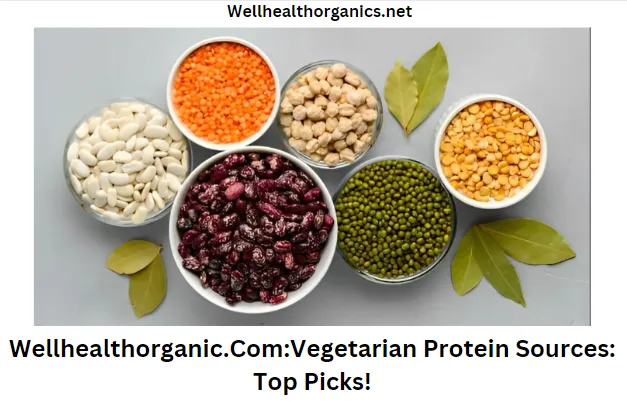Wellhealthorganic.com highlights diverse vegetarian protein sources, such as lentils, chickpeas, quinoa, tofu, and nuts. These foods ensure balanced nutrition for vegetarians.
Protein is crucial for muscle repair, enzyme production, and overall health. Vegetarians often worry about meeting their protein needs without meat. Fortunately, numerous plant-based options provide ample protein. Lentils and chickpeas are rich in protein and versatile in recipes. Quinoa offers a complete protein profile containing all essential amino acids.
Tofu is a popular soy-based protein source with various culinary uses. Nuts and seeds, like almonds and chia seeds, are excellent for snacking and adding to meals. Incorporating these foods into a vegetarian diet ensures adequate protein intake and promotes overall well-being.
Contents
- 1 The Rise Of Vegetarianism
- 2 Protein: A Vital Nutrient
- 3 Challenges Of Vegetarian Protein
- 4 Legumes: A Powerhouse Of Protein
- 5 Whole Grains: More Than Just Fiber
- 6 Nuts And Seeds: The Snackable Proteins
- 7 Soy Products: Versatile And Protein-rich
- 8 Dairy Alternatives For Vegetarians
- 9 Protein-rich Vegetables And Greens
- 10 Incorporating Protein Into Vegetarian Meals
- 11 Supplements And Protein Powders
- 12 Tips For Transitioning To A Vegetarian Diet
- 13 Conclusion
The Rise Of Vegetarianism
The trend of vegetarianism is growing worldwide. More people choose plant-based diets. This shift is driven by health, ethical, and environmental reasons. The benefits are both personal and global.
Health And Ethical Benefits
Eating vegetarian can improve health. Plant-based diets are rich in nutrients and help reduce the risk of chronic diseases like heart issues and diabetes.
Ethically, vegetarianism avoids animal cruelty, which many people find more humane. It aligns with the values of compassion and kindness toward animals.
Environmental Impact
Vegetarianism also has a positive environmental impact. Producing plant foods uses less water and land. It generates fewer greenhouse gases than meat production.
Here’s a quick comparison:
| Factor | Meat Production | Plant Production |
| Water Usage | High | Low |
| Land Usage | High | Low |
| Greenhouse Gases | High | Low |
Switching to vegetarian foods can help save the planet. It supports sustainability and reduces pollution.
Protein: A Vital Nutrient
Proteins are the building blocks of life. They play a crucial role in maintaining health. Understanding the importance of protein can help you choose the best vegetarian sources. Let’s dive into why protein is so vital for our bodies.
Functions In The Body
Proteins perform many vital functions in the body. These functions include:
- Building and repairing tissues – Proteins help in muscle growth and tissue repair.
- Enzyme production – Many enzymes are proteins that help with digestion and metabolism.
- Hormone regulation – Proteins aid in creating hormones that regulate bodily functions.
- Immune function – Proteins form antibodies that help fight infections.
- Energy source – Without carbs and fats, proteins provide energy.
Recommended Dietary Allowances
It’s essential to consume the right amount of protein daily. Here are the recommended dietary allowances (RDA) for different age groups:
| Age Group | RDA (grams/day) |
| Children (1-3 years) | 13 |
| Children (4-8 years) | 19 |
| Teens (9-13 years) | 34 |
| Teens (14-18 years) | 46-52 |
| Adults (19+ years) | 46-56 |
These values ensure you get enough protein for your body’s needs. It’s important to spread protein intake throughout the day, as this helps the body better absorb and utilize it.
Challenges Of Vegetarian Protein
Getting enough protein on a vegetarian diet can be tricky. Many people believe that meat is the only source of protein, but the challenge persists.
Wellhealthorganic.Com provides information on vegetarian protein sources. Despite their availability, challenges remain. Let’s explore these challenges in detail.
Myths And Facts
Many myths surround vegetarian protein sources. Some think plant-based proteins still need to be completed. This is only sometimes true. Several plant-based proteins are complete.
| Myth | Fact |
| Vegetarians can’t get enough protein. | Vegetarians can meet protein needs with a varied diet. |
| Plant proteins are better than animal proteins. | Plant proteins can be just as effective. |
| Only animal protein builds muscle. | Plant proteins also help build muscle. |
Combating Deficiency Concerns
Protein deficiency is a concern for vegetarians. But it can be managed. Include a variety of protein sources in your diet. This ensures you get all amino acids.
- Beans and Legumes: High in protein and fibre.
- Nuts and Seeds: Provide healthy fats and protein.
- Soy Products: Tofu and tempeh are excellent choices.
- Whole Grains: Quinoa and brown rice are nutritious.
Planning your meals helps a lot. Here’s a simple meal plan to ensure adequate protein intake:
- Breakfast: Smoothie with spinach and chia seeds.
- Lunch: Quinoa salad with beans and veggies.
- Snack: Almonds and a piece of fruit.
- Dinner: Stir-fried tofu with broccoli and brown rice.
Legumes: A Powerhouse Of Protein
Legumes are one of the best sources of vegetarian protein. They are nutritious, versatile, and affordable. You can easily include them in your diet. This section will explore different legumes that provide high protein.
Lentils And Beans
Lentils are tiny but mighty. They are packed with protein, fibre, and vitamins. One Cup of cooked lentils offers about 18 grams of protein. You can use lentils in soups, salads, and stews.
Beans come in many varieties, like black beans, kidney beans, and pinto beans. They are rich in protein and essential nutrients. One Cup of cooked black beans provides 15 grams of protein. Beans can be used in chilli, burritos, and casseroles.
| Type of Bean | Protein per Cup (g) |
| Black Beans | 15 |
| Kidney Beans | 13 |
| Pinto Beans | 14 |
Chickpeas And Peas
Chickpeas, also known as garbanzo beans, are a protein-rich legume. One Cup of cooked chickpeas provides around 14 grams of protein. They are great in hummus, salads, and curries.
Peas are another excellent source of protein. Green peas offer about 9 grams of protein per Cup. You can add peas to soups, stir-fries, and pasta dishes.
- Chickpeas – 14 grams per Cup
- Green Peas – 9 grams per Cup
Whole Grains: More Than Just Fiber
Whole grains are not just about fibre. They are rich in protein, too. Including them in your diet can boost your nutrient intake. Let’s explore some powerful whole grains.
Quinoa And Amaranth
Quinoa is a complete protein containing all nine essential amino acids. One Cup of quinoa offers about 8 grams of protein. It’s also high in iron and magnesium.
Amaranth is another complete protein source, containing about 9 grams of protein per Cup. It is also rich in calcium and iron. Both grains are gluten-free, making them great for celiac diets.
Brown Rice And Oats
Brown Rice is a versatile grain. It provides around 5 grams of protein per Cup and is high in manganese and selenium. Brown rice is a staple in many vegetarian diets.
Oats are not just for breakfast. They offer around 6 grams of protein per Cup and are rich in beta-glucan, which helps lower cholesterol. They are perfect for a hearty meal or snack.
Nuts And Seeds: The Snackable Proteins
Nuts and seeds are fantastic sources of vegetarian protein. They are easy to snack on and packed with nutrients. Let’s explore some of the best options.
Almonds And Walnuts
Almonds are rich in protein and fibre. A handful can keep you full for hours. They also contain healthy fats and vitamins.
Walnuts are another excellent choice. They contain a good amount of protein and omega-3 fatty acids, which support brain health and help reduce inflammation.
| Nutrient | Almonds (per 100g) | Walnuts (per 100g) |
| Protein | 21g | 15g |
| Fiber | 12g | 7g |
| Healthy Fats | 50g | 65g |
Chia Seeds And Flaxseeds
Chia seeds are tiny but mighty. They are packed with protein and fibre. Chia seeds also offer omega-3 fatty acids and antioxidants.
Flaxseeds are another powerhouse. They provide protein and are rich in lignans, which have antioxidant properties. Flaxseeds also aid in digestion.
- Chia Seeds: 17g protein per 100g
- Flaxseeds: 18g protein per 100g
- Both have high-fibre content
- Both offer omega-3 fatty acids
Soy Products: Versatile And Protein-rich
Soy products offer a rich source of protein for vegetarians. They are versatile and can be used in many dishes. Whether you are making a salad, soup, or main dish, soy products can fit in perfectly.
Tofu And Tempeh
Tofu is made from soybeans. It is soft and absorbs flavours well. You can grill, stir-fry, or blend it into smoothies.
Tempeh is fermented soybeans with a firm texture and a nutty taste. It can be sliced, marinated, and cooked in various ways.
| Product | Protein per 100g |
| Tofu | 8g |
| Tempeh | 19g |
Edamame And Soy Milk
Edamame are young soybeans. They are usually steamed or boiled. You can eat them as a snack or add them to salads.
Soy milk is a liquid made from soybeans. It is an excellent alternative to dairy milk. You can use it in coffee, cereal, or baking.
- Edamame: 11g of protein per 100g
- Soy Milk: 3.3g of protein per 100ml
Dairy Alternatives For Vegetarians
Dairy alternatives are essential for vegetarians who avoid milk products. They provide necessary protein and other nutrients, and they are delicious and easy to incorporate into one’s diet.
Nut milk and Coconut Yogurt
Nut milk is a popular dairy alternative. Almond, cashew, and hazelnut milk are common choices. Nut milk is rich in protein and vitamins and low in calories and fats.
| Nut Milk | Protein Content (per Cup) | Calories (per Cup) |
| Almond Milk | 1g | 30-50 |
| Cashew Milk | 1g | 25-50 |
| Hazelnut Milk | 2g | 30-60 |
Coconut yoghurt is another great option. It is made from coconut milk and is creamy and delicious. It also contains probiotics that promote gut health.
Plant-based Cheese
Plant-based cheese is made from nuts, seeds, and soy. It mimics the taste and texture of dairy cheese. Many varieties are available, including cheddar, mozzarella, and cream cheese.
- Cashew Cheese: Creamy, rich, and versatile.
- Soy Cheese: High in protein and melts well.
- Almond Cheese: Slightly sweet and nutty.
Plant-based cheese is a tasty and nutritious alternative to dairy cheese, perfect for sandwiches, salads, and cooking.
Protein-rich Vegetables And Greens
Vegetables and greens are not just tasty; they are packed with nutrients. Many of them provide a good amount of protein. Adding these protein-rich vegetables and greens to your diet can boost your health. They are perfect for vegetarians and anyone looking for plant-based protein sources.
Broccoli And Spinach
Broccoli is a powerhouse of nutrients. It has about 2.8 grams of protein per Cup and is rich in vitamins C and K. This vegetable helps boost the immune system and promote healthy bones.
Spinach is another excellent source of protein. One Cup of cooked spinach contains around 5 grams of protein. It is also high in iron, calcium, and magnesium. Spinach supports muscle growth and helps maintain good heart health.
Mushrooms And Asparagus
Mushrooms are not only delicious but also nutritious. A cup of cooked mushrooms provides about 3 grams of protein. They are also rich in antioxidants, which help fight free radicals in the body.
Asparagus is another excellent protein source. One Cup of cooked asparagus contains nearly 4 grams of protein. It is also packed with vitamins A, C, and K. Asparagus promotes digestive health and detoxifies.
| Vegetable | Protein per Cup (grams) | Additional Nutrients |
| Broccoli | 2.8 | Vitamins C, K |
| Spinach | 5 | Iron, Calcium, Magnesium |
| Mushrooms | 3 | Antioxidants |
| Asparagus | 4 | Vitamins A, C, K |
Incorporating Protein Into Vegetarian Meals
Achieving a balanced diet as a vegetarian requires careful planning. Protein is a crucial nutrient that supports muscle growth and overall health. It’s essential to include a variety of protein-rich foods in your daily meals. This ensures you get all the necessary amino acids. Let’s explore how you can effectively incorporate protein into vegetarian meals.
Creating Balanced Meals
A balanced meal includes protein, carbohydrates, and healthy fats. You can use tofu, beans, lentils, and quinoa as your primary protein sources.
| Food Item | Protein (per 100g) |
| Tofu | 8g |
| Lentils | 9g |
| Quinoa | 4g |
| Chickpeas | 19g |
Combine these items with vegetables, whole grains, and healthy fats to create a nutrient-rich plate.
Protein-packed Recipes
Try these simple and delicious recipes to boost your protein intake.
- Quinoa Salad: Mix cooked quinoa with chickpeas, cucumber, tomatoes, and a lemon dressing.
- Lentil Soup: Cook lentils with carrots, onions, garlic, and vegetable broth for a hearty meal.
- Tofu Stir-Fry: Sauté tofu with bell peppers, broccoli, and soy sauce for a quick, protein-packed dish.
- Quinoa Salad: Cook 1 cup of quinoa. Add 1 cup of chickpeas, 1 cup of diced cucumber, 1 cup of tomatoes, and a lemon dressing. Toss well.
- Lentil Soup: Sauté 1 diced onion and two minced garlic cloves. Add 1 cup of lentils, two diced carrots, and 4 cups of vegetable broth. Cook until lentils are tender.
- Tofu Stir-Fry: Sauté 200g of cubed tofu with one sliced bell pepper and 1 cup of broccoli. Add two tablespoons of soy sauce. Serve hot.
These recipes are easy to make and full of flavour. They ensure you get enough protein in your diet.
Supplements And Protein Powders
Finding sufficient protein sources can be challenging for those following a vegetarian diet. Supplements and protein powders offer a convenient solution to bridge the protein gap. These supplements are easy to incorporate into daily meals and snacks.
Choosing The Right Supplement
Choosing the right supplement involves understanding your dietary needs. Look for protein powders with high protein content per serving. Check the ingredient list to ensure no hidden additives or artificial ingredients.
- Read labels carefully
- Verify protein content per serving
- Check for any allergens
Consider the taste and texture. Some protein powders can be gritty or unpleasant. Read reviews or get small samples before committing to a large purchase.
Natural Vs. Synthetic
Natural protein powders are derived from whole food sources, including pea, hemp, and brown rice proteins. They are minimally processed and retain most of the nutrients found in the original food.
Synthetic protein powders are often made from isolated components, such as whey protein isolate or soy protein isolate. They undergo significant processing to remove fats and carbohydrates, focusing solely on protein.
| Natural Protein Powders | Synthetic Protein Powders |
| Pea Protein | Whey Protein Isolate |
| Hemp Protein | Soy Protein Isolate |
| Brown Rice Protein | Casein Protein |
Natural options are better for those with sensitive stomachs. Synthetic options often have higher protein concentrations per serving. Choose based on your personal needs and dietary restrictions.
Adding supplements and protein powders to your diet can help meet your protein goals. Make informed choices to ensure you get the best benefits from your supplements.
Tips For Transitioning To A Vegetarian Diet
Switching to a vegetarian diet can seem challenging. Yet, with the right tips, it becomes easier. Find out how to make this shift smooth and healthy.
Gradual Changes To Diet
Switching diets overnight may not be sustainable. Start with small steps.
- Replace one meal a day with a vegetarian option.
- Incorporate more fruits and vegetables into your meals.
- Try vegetarian versions of your favourite dishes.
- Experiment with different plant-based proteins.
Consulting A Nutritionist
A nutritionist can provide personalized advice. They help ensure you get all the necessary nutrients.
| Benefit | Description |
| Personalized Meal Plans | Get meals tailored to your dietary needs. |
| Nutrient Monitoring | Ensure you meet your daily nutrient goals. |
| Expert Guidance | Receive tips from a professional. |
Consulting a nutritionist is a great way to transition smoothly. They help you avoid common pitfalls.
Conclusion
Exploring vegetarian protein sources can boost your health and energy levels. Incorporate these nutrient-rich foods into your diet for balanced nutrition. Visit Wellhealthorganic. Come for more tips on healthy living and vegetarian recipes. Embrace a healthier lifestyle with these plant-based protein options.
>>>Also Read About: Https://Wellhealthorganic.Com/How-Protein-Can-Help-You-Lose-Weight: Shed Pounds Fast!










